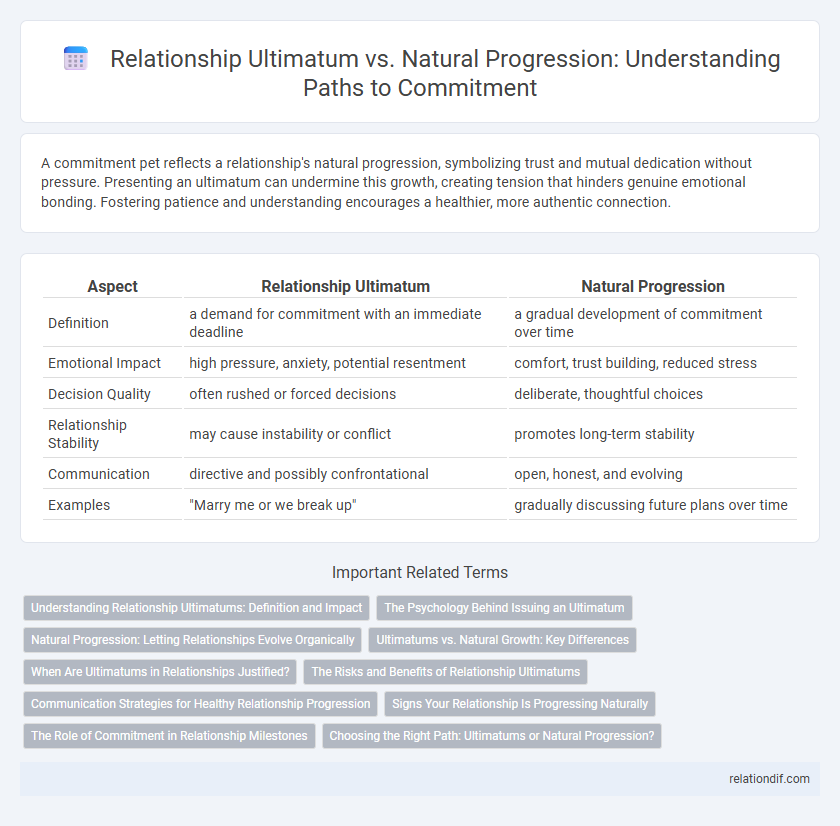A commitment pet reflects a relationship's natural progression, symbolizing trust and mutual dedication without pressure. Presenting an ultimatum can undermine this growth, creating tension that hinders genuine emotional bonding. Fostering patience and understanding encourages a healthier, more authentic connection.
Table of Comparison
| Aspect | Relationship Ultimatum | Natural Progression |
|---|---|---|
| Definition | a demand for commitment with an immediate deadline | a gradual development of commitment over time |
| Emotional Impact | high pressure, anxiety, potential resentment | comfort, trust building, reduced stress |
| Decision Quality | often rushed or forced decisions | deliberate, thoughtful choices |
| Relationship Stability | may cause instability or conflict | promotes long-term stability |
| Communication | directive and possibly confrontational | open, honest, and evolving |
| Examples | "Marry me or we break up" | gradually discussing future plans over time |
Understanding Relationship Ultimatums: Definition and Impact
Relationship ultimatums are explicit demands that pressure partners to make immediate decisions, often leading to tension and resistance. Understanding the negative impact of ultimatums is crucial, as they can undermine trust and hinder natural progression in commitment. Healthy relationships develop through mutual communication and gradual growth rather than forced choices.
The Psychology Behind Issuing an Ultimatum
Issuing an ultimatum often stems from underlying fears of rejection or abandonment, reflecting a need for control within the relationship's uncertain dynamics. Psychological research indicates that ultimatums can trigger defensive behaviors, hindering natural emotional intimacy and authentic connection between partners. Understanding attachment styles and communication patterns helps reveal why ultimatums may sabotage long-term commitment by disrupting trust and mutual respect.
Natural Progression: Letting Relationships Evolve Organically
Natural progression in relationships fosters genuine emotional growth by allowing connections to develop at their own pace without pressure or forced decisions. This organic evolution supports deeper trust and understanding, creating a sustainable foundation for long-term commitment. Embracing natural progression helps partners build authentic bonds that withstand challenges, unlike ultimatums which can induce stress and hinder true intimacy.
Ultimatums vs. Natural Growth: Key Differences
Ultimatums in relationships create sudden pressure and demand immediate decisions, often leading to resistance or resentment, whereas natural progression allows commitment to develop organically over time based on mutual understanding and trust. Ultimatums emphasize control and impose rigid timelines, contrasting with the fluid, adaptive nature of natural growth, which fosters deeper emotional connection and stability. Couples who rely on natural growth typically experience stronger, more resilient bonds compared to those pressured by ultimatums.
When Are Ultimatums in Relationships Justified?
Ultimatums in relationships are justified when clear boundaries are repeatedly crossed, such as infidelity or abuse, requiring immediate change to protect emotional well-being. They serve as a decisive measure to prompt accountability and prevent prolonged uncertainty, contrasting with natural progression which relies on mutual growth and timing. Effective ultimatums emphasize respect and clarity rather than control, ensuring both partners understand the consequences of unresolved issues.
The Risks and Benefits of Relationship Ultimatums
Relationship ultimatums carry the risk of creating pressure that may lead to resentment, undermining genuine connection and trust. However, ultimatums can clarify boundaries and prompt decisive action in situations where communication has failed, potentially preventing prolonged uncertainty. Natural progression fosters organic commitment, but lacks the immediate clarity that ultimatums provide, balancing the negotiation between emotional safety and urgent decision-making.
Communication Strategies for Healthy Relationship Progression
Effective communication strategies prioritize open dialogue and active listening to foster natural progression in relationships rather than resorting to ultimatums that create pressure and resentment. Couples who engage in transparent conversations about expectations and boundaries build trust and mutual understanding, leading to healthier commitment development. Employing empathy and patience during discussions encourages collaboration and emotional safety, essential for sustainable relationship growth.
Signs Your Relationship Is Progressing Naturally
Signs your relationship is progressing naturally include open communication where both partners feel comfortable expressing feelings without pressure. Mutual respect and understanding grow over time, fostering trust and emotional security. Shared goals and experiences develop authentically, reflecting genuine connection rather than forced decisions or ultimatums.
The Role of Commitment in Relationship Milestones
Commitment acts as a foundation for relationship milestones, fostering trust and emotional security that enable natural progression without the need for ultimatums. Establishing clear, mutual commitment encourages partners to evolve together organically, aligning goals and timing for milestones such as moving in, engagement, or marriage. Ultimatums can undermine this process by creating pressure and potential resentment, whereas commitment nurtures a cooperative journey toward shared relationship growth.
Choosing the Right Path: Ultimatums or Natural Progression?
Choosing the right path in commitment involves understanding the impact of ultimatums versus natural progression on relationship dynamics. Ultimatums often create pressure that may lead to resentment, whereas natural progression fosters mutual growth and trust through open communication and shared experiences. Prioritizing natural development supports long-term stability and emotional connection, enhancing relationship satisfaction and resilience.
relationship ultimatum vs natural progression Infographic

 relationdif.com
relationdif.com